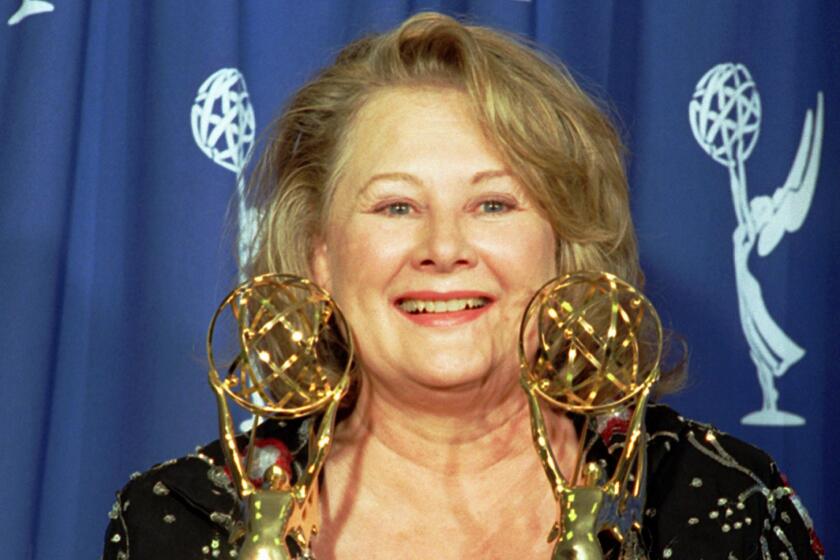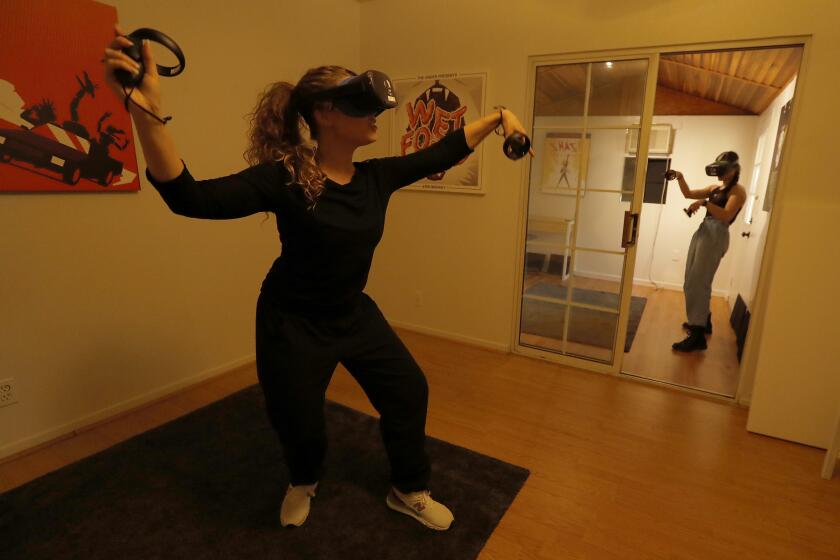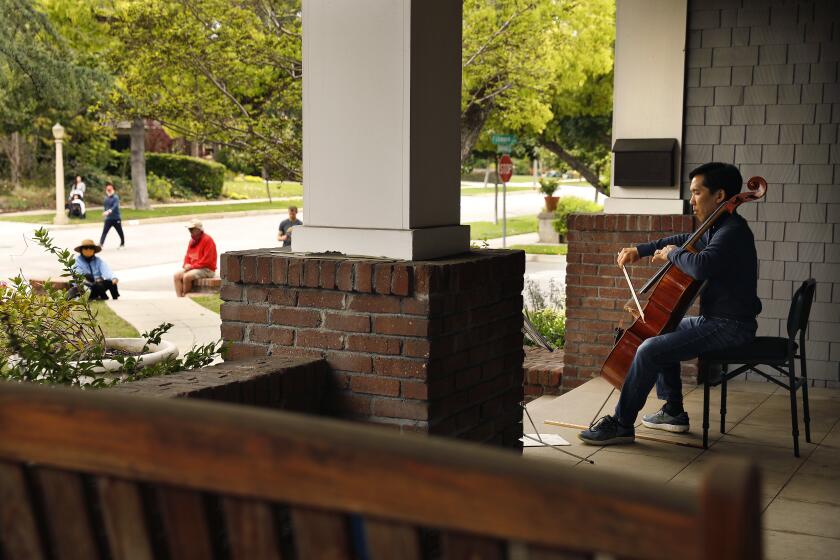How will L.A. theater reopen? Leaders begin talk of the post-coronavirus future
- Share via
“L.A. Theatre in the Time of a Pandemic and Beyond,” the first installment of a new Center Theatre Group series of online public discussions, was surprisingly upbeat. Encouraging without being falsely optimistic.
The artistic leaders who gathered via Zoom last Thursday to discuss “the environment of unknowns,” to use the words of CTG Managing Director and Chief Executive Meghan Pressman, who served as moderator for this inaugural L.A. Theatre Speaks event, didn’t pretend to have answers about when the theaters might safely reopen. But they shared stories of how they’ve been managing the crisis and pooled ideas about how they might move forward.
Most crucially, they offered strength in solidarity. Cohesion hasn’t always been in evidence in the L.A. theater community, which Pressman, a relative newcomer to the scene, aptly described as “robust” yet “fractured.” In leading this conversational initiative, CTG is to be commended for living up to its central role in the city’s theatrical ecosystem.
With rehearsals, productions and fundraising galas postponed for the foreseeable future, these artistic directors have had time to reflect on the bigger picture. Nearly everyone reported being in intensive contact with their colleagues, and not simply to address the financial emergency engulfing their organizations. Brainstorming is now one of the few luxuries their embattled institutions can afford.
A tribute to Tony- and Emmy-winner Shirley Knight, an exemplar of Method who learned from the best of the Actor Studio stars.
Latino Theater Company’s José Luis Valenzuela talked about shoring up relationships through regular Friday meetings online with his community of artists and patrons. The 24th Street Theatre’s Debbie Devine spoke of reaching out to funders to provide the necessary support for new strategies to serve the theater’s young audience. Celebration Theatre’s Michael A. Shepperd shared his experience of Zoom meetings with cocktails (“because what Zoom meetings are we having without cocktails?”) to consider who “in the LGBTQ+++ community” has been left out of the theater’s programming.
The situation is still too grim for talk of silver linings. Pasadena Playhouse’s Danny Feldman characterized the moment as a state of “free fall.” “We have not hit a bottom of something yet,” he said.
CTG’s Michael Ritchie, who sees this as the first phase of a multi-phase crisis, was equally frank: “Honestly, anyone that’s listening to this knows you can’t replace live. It’s impossible. So everything we’re doing in terms of connecting and talking still has value. But it’s all in the service of getting back to the point when we can all be in a room together.”
Los Angeles studio Tender Claws brings live theater to virtual reality with actors at home during coronavirus. It’s a new form of theater.
The uncertainty of that timetable is what makes future programming so challenging.
“Usually, we’re looking two to three years in advance,” explained East West Players’ Snehal Desai. “The world is going to be different once we’re out of this.” The dilemma, he said, is weighing pre-pandemic commitments to artists against the reality of a radically different landscape.
Geffen Playhouse’s Matt Shakman was less worried that previously announced productions might seem obsolete. “Great plays take on a different resonance at the time they’re produced,” he said, citing as examples two planned Geffen offerings, a revival of “Macbeth” (“a lot of Shakespeare was written in times of plague”) and Matthew Lopez’s “The Inheritance” (“a play about a different plague”).
Valenzuela believes that the coronavirus’ disproportionate impact on his community will make the political dimension of theatrical work all the more urgent. Desai, noting that the Asian American community is under attack, said that the hateful rhetoric must be addressed. His concern for the safety of his community extends to the economic security of artists, whose vulnerability in times like these is thrown into relief.
The subject of digital performance provoked as much ambivalence as enthusiasm. As a vehicle for expanding a theater’s audience and profile, it was considered a boon. And there was gratitude that unions were offering some flexibility so that their members could participate. But no one saw the digital stage as a substitute for the real thing.
Boston Court Pasadena’s Jessica Kubzansky said that online content in the first weeks just made her feel tired. But now that she has her “pandemic legs,” she’s more open to exploring the ways virtual platforms can offer artists and audiences temporary solutions for fulfilling that need for storytelling that’s hardwired into us.
Beong-Soo Kim and Bonnie Wongtrakool play cello and piano every weekend. For neighbors in lockdown, the music provides an escape, if only for an hour.
Shepperd said he didn’t want to shame people who don’t want to make art right now. Some people need to heal and be with family, and that’s perfectly understandable, he said.
Valenzuela is already thinking ahead to the day when technology can perhaps serve as a bridge to those theatergoers who may want to buy a subscription but aren’t yet prepared to attend a live performance. He’s imagining the possibility of a bifurcated audience in the initial period back.
Devine is similarly viewing digital as a useful intermediary. “We are accessing each other in ways we have not done in the past,” she said. Still, she made clear that the ultimate message must be: “We want to see you in the temple.”
Feldman has been communicating directly with his alumni artists to gain a better understanding of how they’re seeing the world. He’s less interested in imposing ideas on artists than in hearing from them about the tools they have to tell the stories they’re compelled to tell.
Desai observed that as impressively produced as some of the online offerings have been, “there’s something hollow because that finishing component, the engagement between the artists and the audience, is missing. And there’s nothing that can replace that,” though he did see benefit to the way technology can allow us to think more broadly about theatrical form.
Ritchie doesn’t find online readings all that inspiring, but said he was becoming more intrigued about possibilities in virtual environments. He named Michael Urie’s recent livestream performance of “Buyer & Cellar” as a success and was enthusiastic about the news that Richard Nelson has written a play for his Apple Family series, in which the quarantined characters are in communication via Zoom. (New York’s Public Theater just announced that Nelson’s “What Do We Need to Talk About? Conversations on Zoom” will stream live for free on Wednesday and will remain available for four days.)
There was much excitement around the Geffen’s upcoming production of “The Present,” a “live, virtual and interactive” offering from the artful illusionist Helder Guimarães. “We’re trying to figure out how to use this new proscenium and create a communal event where magic is actually happening in your own hands because you get a magic box sent to you,” explained Shakman, referring to the prop that will be mailed to audience members for use during the online show.
There was some tentative speculation about how live theater might resume, but no clear path forward. How will social distancing affect attendance size? Ritchie expressed fear that the environment may not be robust, but said it would be premature to talk about numbers.
“We’ve always been challenged as a cost-effective art form and now we’re going to have more restrictions on how to keep everyone safe,” Desai said. “We’re going to have to look again at the cost of production. Producing for a quarter of the audience who would normally see us is going to shake things up.”
Kubzansky is eyeing her theater’s parking lot as a possible location for future performances.
“We are thinking about potentially offering some drive-in theater,” she said. “We reinvent the concept of live and together when people are understandably nervous about being too close to other people.”
Everyone had faith that the theater, which Ritchie humorously reminded the group was the second oldest profession, will survive the coronavirus crisis. “We are a resilient cockroach kind of group,” said Feldman, approvingly.
“I bristle every time I read the phrase new normal,” Shakman said. “I recognize there will be some changes, but we will have normal back. And I just want everyone to know that. We all will sit in a theater again. The Spanish flu was devastating and they didn’t have the scientific advances that we have now. And people still sat in a theater a year or so after that, and we will get there.”
More to Read
The biggest entertainment stories
Get our big stories about Hollywood, film, television, music, arts, culture and more right in your inbox as soon as they publish.
You may occasionally receive promotional content from the Los Angeles Times.















